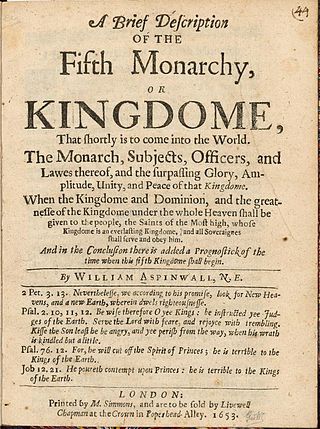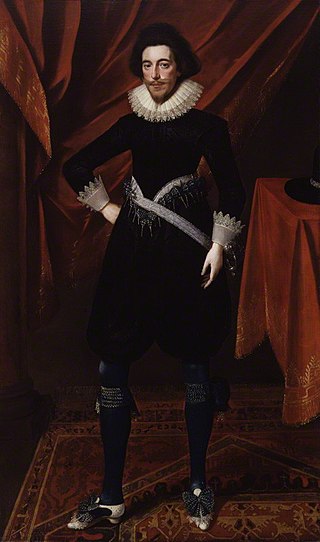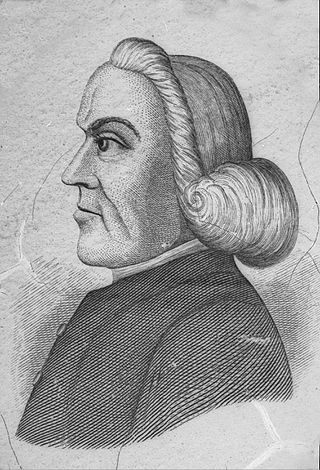Related Research Articles

The English Civil War was a series of civil wars and political machinations between Royalists and Parliamentarians in the Kingdom of England from 1642 to 1651. Part of the wider 1639 to 1653 Wars of the Three Kingdoms, the struggle consisted of the First English Civil War and the Second English Civil War. The Anglo-Scottish War of 1650 to 1652 is sometimes referred to as the Third English Civil War.

The Fifth Monarchists, or Fifth Monarchy Men, were a Protestant sect with Millennialist views, active during the 1649 to 1660 Commonwealth of England. The group took its name from a prophecy that claimed the Four kingdoms of Daniel would precede the Fifth, which would see the establishment of the Kingship and kingdom of God on earth.

Henry Rich, 1st Earl of Holland, was an English courtier and politician executed by Parliament after being captured fighting for the Royalists during the Second English Civil War. Younger brother of Robert Rich, 2nd Earl of Warwick, a Puritan activist and commander of the Parliamentarian navy during the Wars of the Three Kingdoms, Henry was better known as an "extravagant, decorative, quarrelsome and highly successful courtier".

Robert Devereux, 3rd Earl of Essex, KB, PC was an English Parliamentarian and soldier during the first half of the 17th century. With the start of the Civil War in 1642, he became the first Captain-General and Chief Commander of the Parliamentarian army, also known as the Roundheads. However, he was unable and unwilling to score a decisive blow against the Royalist army of King Charles I. He was eventually overshadowed by the ascendancy of Oliver Cromwell and Thomas Fairfax, and resigned his commission in 1646.

Howell Harris was a Calvinistic Methodist evangelist. He was one of the main leaders of the Welsh Methodist revival in the 18th century, along with Daniel Rowland and William Williams Pantycelyn.

Sir Robert Harley was an English statesman who served as Master of the Mint for Charles I. A devout Puritan, he supported Parliament in the Wars of the Three Kingdoms.

The Ironsides were troopers in the Parliamentary cavalry trained by English political and military leader Oliver Cromwell in the 17th century, during the English Civil War. The name came from "Old Ironsides," one of Cromwell's nicknames. It was after the battle of Marston Moor on 2 July 1644 that Prince Rupert of the Rhine, the commander of the Royalist Army, "first gave the nickname to his enemy of 'Old Ironsides' because his ranks were so impenetrable--the name originated with the man and passed on to his regiment".
John Penry was executed for high treason during the reign of Queen Elizabeth I. He is Wales' most famous Protestant Separatist martyr.

The Wars of the Three Kingdoms, sometimes known as the British Civil Wars, were a series of intertwined conflicts fought between 1639 and 1653 in the kingdoms of England, Scotland and Ireland, then separate entities united in a personal union under Charles I. They include the 1639 to 1640 Bishops' Wars, the First and Second English Civil Wars, the Irish Confederate Wars, the Cromwellian conquest of Ireland and the Anglo-Scottish War of 1650–1652. They resulted in victory for the Parliamentarian army, the execution of Charles I, the abolition of monarchy, and founding of the Commonwealth of England, later The Protectorate, a unitary state which controlled the British Isles until the Stuart Restoration in 1660.
VavasorPowell was a Welsh Puritan and Fifth Monarchist, imprisoned for his role in a plot to depose King Charles II.
Morgan Llwyd was a Puritan Fifth Monarchist and Welsh-language poet and prose author.

The battle of Powick Bridge was a skirmish fought on 23 September 1642 south of Worcester, England, during the First English Civil War. It was the first engagement between elements of the principal field armies of the Royalists and Parliamentarians. Sir John Byron was escorting a Royalist convoy of valuables from Oxford to King Charles's army in Shrewsbury and, worried about the proximity of the Parliamentarians, took refuge in Worcester on 16 September to await reinforcements. The Royalists despatched a force commanded by Prince Rupert. Meanwhile, the Parliamentarians sent a detachment, under Colonel John Brown, to try to capture the convoy. Each force consisted of around 1,000 mounted troops, a mix of cavalry and dragoons.

David Jenkins was a Welsh judge and Royalist during the English Civil War.

Sir Edward Harley was an English politician from Herefordshire. A devout Puritan who fought for Parliament in the First English Civil War, Harley belonged to the moderate Presbyterian faction, which opposed the involvement of the New Model Army in the peace negotiations that followed victory in 1646. Elected MP for Herefordshire in 1646, he was one of the Eleven Members forced into temporary exile by the army in 1647.
Sir Trevor Williams, 1st Baronet of Llangibby, Monmouthshire, was a Welsh gentry landowner and politician who sat in the House of Commons at various times between 1660 and 1692. He played a significant part in events during and after the English Civil War in South Wales, siding first with King Charles, then with the Parliamentarians, before rejoining the Royalists in 1648.
Walter Cradock was a Welsh Anglican clergyman, who became a travelling evangelical preacher. He was a founder of the first Independent church in Wales in 1638, at Llanvaches, with William Wroth and William Thomas, an early Baptist.
Barzillai Jones was Dean of Lismore from 1683 until 1690.
Jenkin Jones may refer to:

The Battle of Y Dalar Hir took place on 5 June 1648 in Caernarfonshire, North Wales, during the Second English Civil War. While little more than a skirmish, it had a significant effect on the local progress of the conflict.

The early modern period in Wales is the period in the history of Wales from 1500 to 1800.
References
- ↑ Richards, Thomas. "Jones, Jenkin (1623–?), captain in the Parliamentary army and Puritan preacher". Dictionary of Welsh Biography . National Library of Wales . Retrieved 22 October 2008.